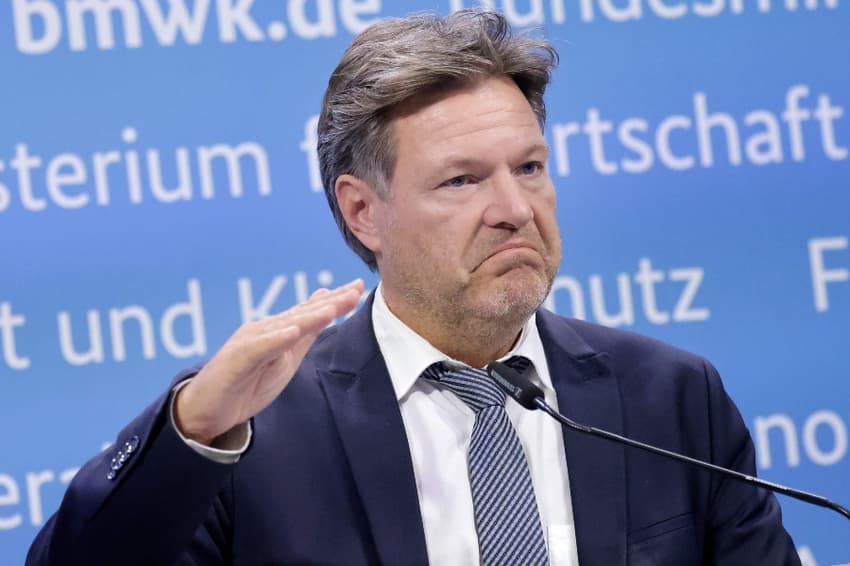Should Germany rethink its strict debt rules in times of crisis?

Germany's strict debt rules ought to be redesigned for times of economic crisis, Economy Minister Robert Habeck said Tuesday, opening up a new debate over Berlin's parsimonious approach to public spending.
A strict spending limit had been designed in an era of benign "globalisation, friendly coexistence and cheap Russian gas", which had now come to an end, Habeck said at the presentation of an industrial strategy paper.
"We have to think about whether the rules that we gave ourselves in another time... are suitable for the new time," Habeck said at a press conference, with reference to Germany's constitutionally enshrined "debt brake".
The emblematic commitment to balanced budgets, which was passed by former Chancellor Angela Merkel's government in 2009, caps Germany's new borrowing to 0.35 percent of gross domestic product.
The brake was lifted for three years at the start of the coronavirus pandemic in 2020 to cushion the blow from lockdowns.
READ ALSO: Germany to 'borrow over €45 billion' in 2023 to combat energy crisis
But the limit will come back into force in 2023, reflecting a commitment made in the 2021 coalition agreement between Chancellor Olaf Scholz's Social Democrats, Habeck's Greens and the pro-business FDP.
Habeck stressed that the parties' agreement, "including the debt brake", continued to hold, with Finance Minister Christian Lindner first among those who have made a return to German fiscal orthodoxy a priority.
A possible adjustment to Germany's fiscal rules should be discussed "at the latest in the next legislative period", beginning after the next general election in 2025, according to the strategy paper presented by Habeck.
Moscow's invasion of Ukraine brought an end to the free flow of gas to Germany from Russia, sending energy costs soaring, and pushed Berlin to up military spending in response to perceived new threats.
To respond to the crises, while ensuring that the 2023 budget complied with the debt brake, the government has had to resort to creating special funds that are outside the official budget.
One is a €100 billion fund to modernise Germany's armed forces, the other is a €200 billion support package to help shield households and businesses from higher energy costs.
Comments
See Also
A strict spending limit had been designed in an era of benign "globalisation, friendly coexistence and cheap Russian gas", which had now come to an end, Habeck said at the presentation of an industrial strategy paper.
"We have to think about whether the rules that we gave ourselves in another time... are suitable for the new time," Habeck said at a press conference, with reference to Germany's constitutionally enshrined "debt brake".
The emblematic commitment to balanced budgets, which was passed by former Chancellor Angela Merkel's government in 2009, caps Germany's new borrowing to 0.35 percent of gross domestic product.
The brake was lifted for three years at the start of the coronavirus pandemic in 2020 to cushion the blow from lockdowns.
READ ALSO: Germany to 'borrow over €45 billion' in 2023 to combat energy crisis
But the limit will come back into force in 2023, reflecting a commitment made in the 2021 coalition agreement between Chancellor Olaf Scholz's Social Democrats, Habeck's Greens and the pro-business FDP.
Habeck stressed that the parties' agreement, "including the debt brake", continued to hold, with Finance Minister Christian Lindner first among those who have made a return to German fiscal orthodoxy a priority.
A possible adjustment to Germany's fiscal rules should be discussed "at the latest in the next legislative period", beginning after the next general election in 2025, according to the strategy paper presented by Habeck.
Moscow's invasion of Ukraine brought an end to the free flow of gas to Germany from Russia, sending energy costs soaring, and pushed Berlin to up military spending in response to perceived new threats.
To respond to the crises, while ensuring that the 2023 budget complied with the debt brake, the government has had to resort to creating special funds that are outside the official budget.
One is a €100 billion fund to modernise Germany's armed forces, the other is a €200 billion support package to help shield households and businesses from higher energy costs.
Join the conversation in our comments section below. Share your own views and experience and if you have a question or suggestion for our journalists then email us at [email protected].
Please keep comments civil, constructive and on topic – and make sure to read our terms of use before getting involved.
Please log in here to leave a comment.